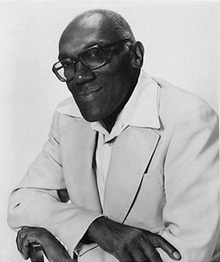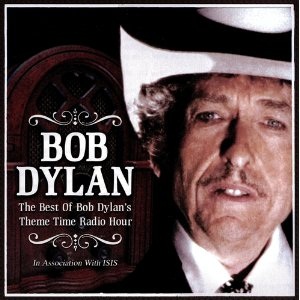
Tony Russell "Charles" Brown was an American singer and pianist whose soft-toned, slow-paced nightclub style influenced West Coast blues in the 1940s and 1950s. Between 1949 and 1952, Brown had seven Top 10 hits in the U.S. Billboard R&B chart. His best-selling recordings included "Driftin' Blues" and "Merry Christmas Baby".

Amos 'n' Andy was an American radio sitcom about black characters, initially set in Chicago then later in the Harlem section of New York City. While the show had a brief life on 1950s television with black actors, the 1928 to 1960 radio show was created, written and voiced by two white actors, Freeman Gosden and Charles Correll, who played Amos Jones (Gosden) and Andrew Hogg Brown (Correll), as well as incidental characters. On television, 1951–1953, black actors took over the majority of the roles; white characters were infrequent.

Benjamin Clarence "Bull Moose" Jackson was an American blues and rhythm-and-blues singer and saxophonist, who was most successful in the late 1940s. He is considered a performer of dirty blues because of the suggestive nature of some of his songs, such as "I Want a Bowlegged Woman" and "Big Ten Inch Record".

Joseph Amos Milburn was an American R&B singer and pianist, popular in the 1940s and 1950s. One commentator noted, "Milburn excelled at good-natured, upbeat romps about booze and partying, imbued with a vibrant sense of humour and double entendre, as well as vivid, down-home imagery in his lyrics."
Wayne Talmadge Bennett was an American blues guitarist, best remembered for his performances and recordings with Bobby Bland between the 1950s and 1980s.
"Pledging My Love" is a blues ballad. It was written by Ferdinand Washington and Don Robey and published in 1954.

"Tequila" is a 1958 Latin-inspired surf instrumental song written by Chuck Rio and recorded by American Rock and roll band The Champs. "Tequila" became a No. 1 hit on both the pop and R&B charts at the time of its release and continues to be strongly referenced in pop culture to this day.
"Cocaine Blues" is a Western swing song written by Troy Junius Arnall, a reworking of the traditional song "Little Sadie." Roy Hogsed recorded a well known version of the song in 1947.

"For the Love of Money" is a soul, funk song that was written and composed by Kenneth Gamble, Leon Huff, and Anthony Jackson; it was recorded by Philadelphia soul group The O'Jays for the album Ship Ahoy. Produced by Gamble and Huff for Philadelphia International Records, "For the Love of Money" was issued as a single in late 1973, with "People Keep Tellin' Me" as its B-side. The single peaked at number three on the U.S. Billboard R&B chart, and at No. 9 on Billboard's Pop Singles chart in spring 1974. Though the album version of the song was over seven minutes long, it received substantial radio airplay. The song's title comes from a well-known Bible verse, 1 Timothy 6:10: "For the love of money is the root of all evil: which while some coveted after, they have erred from the faith, and pierced themselves through with many sorrows." The song was also used as the opening theme song for NBC’s The Apprentice.

"The End of the World" is a pop song written by composer Arthur Kent and lyricist Sylvia Dee, who often worked as a team. They wrote the song for American singer Skeeter Davis, and her recording of it was highly successful in the early 1960s, reaching the top five on four different charts, including No. 2 on the main Billboard Hot 100. It spawned many cover versions.

Thomas Maxwell Davis, Jr., was an American rhythm and blues saxophonist, arranger, bandleader and record producer.

Willie Littlefield, Jr., billed as Little Willie Littlefield, was an American R&B and boogie-woogie pianist and singer whose early recordings "formed a vital link between boogie-woogie and rock and roll". Littlefield was regarded as a teenage wonder and overnight sensation when in 1949, at the age of 18, he popularized the triplet piano style on his Modern Records debut single, "It's Midnight". He also recorded the first version of the song "Kansas City", in 1952.
Theme Time Radio Hour (TTRH) was a weekly one-hour satellite radio show hosted by Bob Dylan that originally aired from May 2006 to April 2009. Each episode had a freeform mix of music, centered on a theme rather than genre. Much of the material for the show was culled from producer Eddie Gorodetsky's music collection.
Rudolph Toombs was an American performer and songwriter. He wrote "Teardrops from My Eyes", Ruth Brown's first number one R&B song, and other hit songs for her, including "5-10-15 Hours". He also wrote "One Mint Julep" for The Clovers.
"Bewildered" is a popular song written in 1936 by Teddy Powell and Leonard Whitcup. It was a 1938 hit for Tommy Dorsey and His Orchestra.
"Treat Her Right" is a soul music song, with a standard 12-bar-blues structure. Written by Roy Head and Gene Kurtz, it was recorded by Head and The Traits and released on the Back Beat label in 1965.

"One Bourbon, One Scotch, One Beer" is a blues song written by Rudy Toombs and recorded by Amos Milburn in 1953. It is one of several drinking songs recorded by Milburn in the early 1950s that placed in the top ten of the Billboard R&B chart. Other artists released popular recordings of the song, including John Lee Hooker in 1966 and George Thorogood in 1977.
Rhythm and Blues Revue is a 1955 American concert film directed by Joseph Kohn and Leonard Reed.

Live at the Lighthouse is a live album by jazz group The Three Sounds featuring performances recorded in 1967 at the Lighthouse Club in California and released on the Blue Note label.

The Best of Bob Dylan's Theme Time Radio Hour is a series of four compilation albums featuring songs Bob Dylan played on his shows as a deejay on the XM Satellite Radio and Sirius XM Satellite Radio program, Theme Time Radio Hour, from May 2006 through April 2009. Each album in the series includes 52 songs on two CDs. The tracks cover the range of genres Dylan highlighted on the program, including blues, R&B, rockabilly, doo-wop, soul, jazz, rock-and-roll and country.











